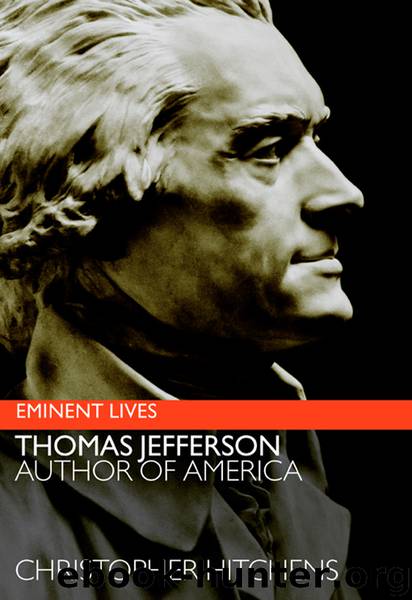Thomas Jefferson by Christopher Hitchens

Author:Christopher Hitchens
Language: eng
Format: epub, mobi
Publisher: HarperCollins
Published: 2005-03-24T16:00:00+00:00
This admonition to Short greatly overstated George Washington’s partisanship for France, but it did not overstate—or not by much—the general American feeling that the Jacobins were making European history, and even European geography, in a fashion closer to the heart’s desire. This exciting prospect perhaps allowed Jefferson his subjective and objective coldness about the fate of those disposable “friends” of his (such as Thomas Paine, who had got into great trouble in France for publicly opposing the death sentence for King Louis, an event written down by Jefferson above as “the extirpation [of] that officer”). After all, were not John Adams and Alexander Hamilton quaking at the number of feasts, bonfires, and celebrations erupting across the United States in solidarity with the cockades of Liberty, Fraternity, and Equality?
This moment of Jeffersonian exhilaration was not to last long. For one thing, no sooner had the French revolutionaries decapitated the king of France than they declared war on the king of England. To the disturbing question of the proper American response to an outbreak of war was added the embarrassment of a new French envoy, hotfoot from the new regime in Paris and naively convinced that America was a place where his welcome could never be worn out. This was Edmond Charles Genet, a man whose advent on the scene was a brilliant fusion of tragedy with farce, both these elements being at Jefferson’s eventual expense.
Here is how matters stood, or had stood until 1793. The United States had a treaty of alliance with France, dating back to 1778 as the seal of Franco-American brotherhood in the Revolutionary War. It had also had a commercial accord with France, dating from 1786, which in case of war mandated that French belligerent vessels would receive favored treatment in American ports. However, the United States was also in constant negotiation with Britain to regularize commercial and military relations, and to try to negotiate an end to the British practice of impressing, or kidnapping, sailors off American ships. Hamilton and the other friends of England argued that the treaties with France no longer applied, since they had been made with the previous monarchical regime. Washington split this difference by issuing a “Proclamation” declaring the United States “impartial” (but not, as Hamilton had wished, “neutral”). Jefferson wanted two things at the same time: for America to profit from any Anglo-French war, at least by supplying both sides with “necessaries,” and for England to be defeated by a global spread of French “republicanism.” (At about this time, those who proclaimed themselves “republican” in America were forming “Democratic” societies and clubs, with Jefferson as their unacknowledged patron.) Thus, his responsibilities as secretary of state were in almost open conflict with his domestic political hopes. He might have managed this contradiction with more aplomb had it not been for Citizen Genet.
This flamboyant and loquacious character disembarked at Charleston in May of 1793, just after George Washington had made his judicious Proclamation. Not in the least impressed by such a compromising
Download
This site does not store any files on its server. We only index and link to content provided by other sites. Please contact the content providers to delete copyright contents if any and email us, we'll remove relevant links or contents immediately.
| U.K. Prime Ministers | U.S. Presidents |
Waking Up in Heaven: A True Story of Brokenness, Heaven, and Life Again by McVea Crystal & Tresniowski Alex(37794)
Empire of the Sikhs by Patwant Singh(23075)
We're Going to Need More Wine by Gabrielle Union(19037)
Hans Sturm: A Soldier's Odyssey on the Eastern Front by Gordon Williamson(18579)
Leonardo da Vinci by Walter Isaacson(13320)
The Radium Girls by Kate Moore(12019)
Tools of Titans by Timothy Ferriss(8370)
Educated by Tara Westover(8047)
How to Be a Bawse: A Guide to Conquering Life by Lilly Singh(7472)
Permanent Record by Edward Snowden(5840)
The Last Black Unicorn by Tiffany Haddish(5630)
The Rise and Fall of Senator Joe McCarthy by James Cross Giblin(5275)
Promise Me, Dad by Joe Biden(5146)
The Wind in My Hair by Masih Alinejad(5092)
A Higher Loyalty: Truth, Lies, and Leadership by James Comey(4955)
The Crown by Robert Lacey(4808)
The Iron Duke by The Iron Duke(4350)
Joan of Arc by Mary Gordon(4104)
Stalin by Stephen Kotkin(3959)
